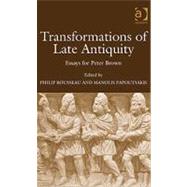Transformations of Late Antiquity: Essays for Peter Brown
, by Rousseau,Philip- ISBN: 9780754665533 | 0754665534
- Cover: Hardcover
- Copyright: 2/28/2009
This book focuses on a simple dynamic: the taking in hand of a heritage, the variety of changes induced within it, and the handing on of that legacy to new generations. Our contributors suggest, from different standpoints, that this dynamic represented the essence of 'late antiquity'. As Roman society, and the societies by which it was immediately bounded, continued to develop, through to the late sixth and early seventh centuries, the interplay between what needed to be treasured and what needed to be explored became increasingly self-conscious, versatile, and enriched. By the time formerly alien peoples had established their 'post-classical' polities, and Islam began to stir in the East, the novelties were more clearly seen, if not always welcomed; and one witnesses a stronger will to maintain the momentum of change, of a forward reach. At the same time, those in a position to play now the role of heirs were well able to appreciate how suited to their needs the 'Roman' past might be, but how, by taking it up in their turn, they were more securely defined and yet more creatively advantaged.'Transformation' is a notion apposite to essays in honour of Peter Brown. 'The transformation of the classical heritage' is a theme to which he has devoted, and continues to devote, much energy. All the essays here in some way explore this notion of transformation; the late antique ability to turn the past to new uses, and to set its wealth of principle and insight to work in new settings. To begin, there is the very notion of what it meant to be 'Roman', and how that notion changed. Subsequent chapters suggest ways in which fundamental characteristics of Roman society were given new form, not least under the impact of a Christian polity. Augustine, naturally, finds his place; and here the emphasis is on the unfettered stance that he took in the face of more broadly held convictions - on miracles, for example, and the errors of the pagan past. The discussion then moves on to examine the very definition of what a Christian culture should look like - in the eyes, for example, of Gregory the Great, who stands in so many respects, at least in the western narrative, as the doorkeeper to a later age. The final chapters carry us into worlds that are more clearly post-classical, clearly medieval and Byzantine.







